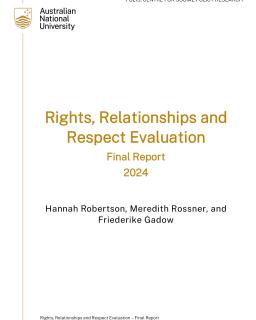
Abstract
The ANU Sexual Violence Prevention Strategy (2019-2026) envisions a violence-free campus, emphasising primary prevention of sexual violence. This includes addressing systemic power imbalances and social norms that drive violence. In response to a 2021 internal review identifying gaps in respectful relationships and consent education, the Respectful Relationships Unit (RRU) and Student Safety and Wellbeing (SSW) developed the Rights, Relationships and Respect (RRR) program. The program includes a compulsory online module for incoming residential students and a pilot curriculum of workshops in select halls.
ANU POLIS: The Centre for Social Policy Research conducted an evaluation to assess the program’s implementation and effectiveness.
RRR Online Module Findings
In 2023, two-thirds of incoming students (4,494) completed the online module. Key survey results from 1,284 respondents indicate:
- 89% completed the module due to its perceived importance.
- 85% rated it as clear and valuable, with positive feedback from female, postgraduate, and international students.
- Students expressed trust in ANU support services, especially among male and international students.
- Learning activities revealed strong student understanding of sexual misconduct policies, consent, and bystander action.
However, students requested clearer guidance on sensitive topics and managing personal boundaries in professional settings.
RRR Workshop Findings
The workshops targeted three residential halls, offering progressive learning on identity, sexual violence prevention, and empowerment. The evaluation highlighted four key themes:
- Engagement: Attendance decreased across workshops (394 → 130). Challenges included session timing, content relevance, and mandatory attendance policies. Female students noted a need for greater male participation. Language and cultural barriers appeared to hinder engagement among international students.
- Culture: Cultural differences across halls appeared to impact engagement. Self-catered and catered halls reported stronger community ties, while the privately-operated hall displayed a dominant party culture, overshadowing inclusivity efforts. Addressing such cultural dynamics is critical to fostering respect.
- Development and Implementation: Co-designed workshops with peer facilitators were well-received for their adaptability and safe learning environment. Continued feedback-driven development was seen as a strength.
- Student Experience and Learning: Reactions were mixed. Some students found content too simple, while others, particularly international students, encountered it for the first time. The workshops raised awareness of consent and gendered violence but called for more actionable strategies and deeper discussions on hall culture.
Conclusion and Recommendations
The RRR program showed positive engagement, particularly through the online module, and has potential to shape a respectful campus culture. However, face-to-face workshops faced challenges in sustaining participation and addressing cultural and language barriers. Future efforts should focus on flexible scheduling, tailoring content to student demographics, and addressing hall-specific cultural dynamics.
Key Recommendations:
- Continue co-designing workshops with peer facilitators.
- Expand workshop topics, including masculinity, coercive behaviour, and alcohol use.
- Tailor approaches for different hall cultures and foster leadership training.
- Monitor and evaluate ongoing program development.
With thoughtful implementation, these recommendations will strengthen the University’s violence prevention efforts and compliance with the upcoming National Higher Education Code to Prevent and Respond to Gender-based Violence.
File attachments
| Attachment | Size |
|---|---|
| Rights-Relationships-and-Respect-Evaluation-Final-Report-2024.pdf(1.2 MB) | 1.2 MB |